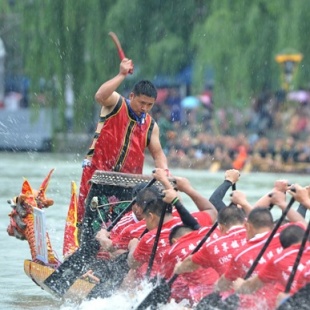Regardless of name, an event worth celebrating


Across Asia
The festival is celebrated not just in China. Some other countries involved in the Belt and Road Initiative also have a tradition of celebrating the Dragon Boat Festival with similar customs.
Both the Chinese calendar and the festival system have spread through regions involved in the initiative to countries alongside since the Han Dynasty (206 BC-AD 220) and the Tang Dynasty (618-907).
According to Xiao, Children's Day on May 5 in Japan was originally called Tango no Sekku, which was one of five annual ceremonies held at the imperial court-it was celebrated on the fifth day of the fifth month in Chinese lunar calendar.
The day was also named Boys' Day, when families raise carp-shaped windsocks outdoors wishing the boys a promising future.
"In Japan, calamus is also valued on this day. From calamus liquor, calamus bath to calamus pillows, people take calamus as a thing to exorcise demons," Xiao says, adding that zongzi is also a festival food in Japan.
Xiao thinks the purpose of celebrating Duanwu in both South Korea and China is the same, which is to ward off evil spirits and avoid plague, although the customs differ.
"For sports events, the Chinese focus on dragon boat racing and Koreans on wrestling," Xiao says.
In Vietnam, people celebrate the Dragon Boat Festival on the fifth day of fifth month under the Vietnamese calendar by eating zongzi and drinking realgar liquor.
"Protecting the children is an important tradition on Duanwu Festival in Vietnam. People would smear realgar liquor on the child's forehead, breast and belly button, and also put five-color rope on their wrists," Xiao says.
For overseas Chinese, the Dragon Boat Festival is also an important holiday to celebrate. "In Southeast Asian countries like Thailand, Malaysia and Singapore, there are many types of zongzi and intense boat races among Chinese. They stick to the cultural traditions of the Dragon Boat Festival," Xiao says.
He thinks the Belt and Road Initiative is not only an economic route, but also one that promotes mutual learning of the festival and spiritual culture.
Celebrating the Duanwu Festival is a tradition that has stood the test of time. Xiao also thinks customs to protect life have a contemporary meaning.
"We can absorb the wisdom and spirit of fighting the difficulties from our tradition of the Duanwu Festival and use them to face the difficulties of current times, whether the Wenchuan earthquake in 2008 or the COVID-19 pandemic," he says.





































